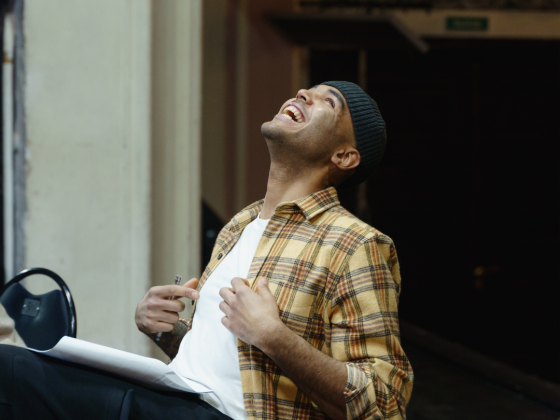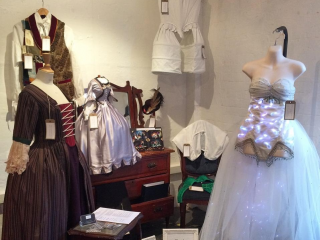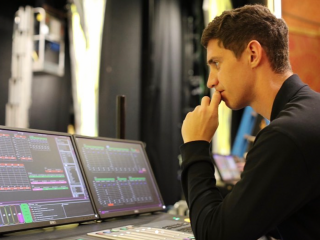As I brew my cup of tea and get ready to hop on a video call, I can’t help but be excited for today’s interview. In 2018, I worked with the fabulous Adam McClelland and still remember him today as the amazing company manager that he is! Originally from Middlesbrough, England, Adam has worked on some of the UK’s biggest shows: Wicked, Mamma Mia!, Shrek and Six to name a few. Fortunately for us, he was kind enough to answer some of my questions today.
Q: First and foremost, can you break down what a stage manager does?
AM: A stage manager is the lynchpin of all the technical departments coming together. On the larger shows, you will have the lighting and sound department, wigs and wardrobe, and automation, and the stage manager brings all of them together to keep everyone going in the right direction. They’ll be setting up rehearsal rooms for the team, getting everything ready in the morning for the day, getting the props set etc. Once you move into the theatre, they will run the technical rehearsals, very much being the key communicator between the departments. For example, I would go to the automation department and say, “this is what we need to achieve, how long do you need?”. So yes, bringing everything together and organising the room is the main focus of the stage manager.
Q: What are the different roles within the stage management team?
AM: In the UK specifically, you have a company manager, stage manager, deputy stage manager, and assistant stage manager. The company manager is comparable to a one-person office in the theatre, and acts as the liaison between the show and the production office. As a company manager, I can make decisions on spending, budgets, HR, payroll etc when the office aren’t working. We are the first point of contact for any challenges on the show. For example, if there was a show stop, the company manager would be the one to inform the producers.
Next, the stage manager is the head of the department, just like your sound 1 or LX 1 would be. They are backstage and don’t have set cues to follow as they are managing the stage management team. They’ll make sure everyone is in place for the start of the show and will okay the show to start. Once it has started, the focus is safety. You’re watching the scene changes happen, the automation move, the flies coming in. There’s a lot of standing and staring because they are keeping track of anything that could go wrong. They are also one of the only people who can speak to the other departments during the show. They have a lot of admin work, scheduling the day etc and they will liaise with the different venue techs from theatre to theatre on touring shows.
The deputy stage manager is your show caller, so the person who sits backstage and reads the script, calls the lighting, sound, automation, and effects. They are the stage manager’s eyes because they have access to all the cameras.
Finally, the assistant stage managers are basically props managers. They manage the crew in the wings and keep track of all the different props used in the show.
Q: How did you get your start working in the stage management department?
When I was younger, I always wanted to be a performer so when I went to college (ages 16-18) I did performing arts initially, but had to do a technical element as well. It was my lecturer who told me “you should be a stage manager, because you’re very organized and thorough” so I started that and realized I actually quite liked it. And that was it. From college, I applied to drama schools in London and ultimately went to Mountview. In the first year you do everything: lighting, sound, costume making, props etc and then you specialize afterwards. I had done stage management and enjoyed it, but I wanted to get that experience to see if I liked one of the other departments better.
Weirdly, my first job came from carrying a toilet out the back of somebody’s car. I was at school one day, and we had an external (freelance) stage manager come in who I’d never spoken to before, and she asked if someone could help her move something out of her car. So, I said sure, we went down and lifted a toilet on wheels that she needed for a show. We put it in the lift, and I didn’t think about it again. About two months later, I was asked to go have a chat and was told by my lecturer that they had a job for me when I finished school at the Hackney panto, which at the time, was the biggest in London. When I got to the interview, it was the lady with the toilet. She said that I had helped without hesitation, always said hello and was polite, and that’s the type of people they wanted to work with! It just goes to show, always be nice!
Q: What skills do you need as a stage manager?
You have to be a good listener and a good communicator. There will be times that you’re communicating about things you don’t know, so you can’t be scared ask the questions. I’m always that annoying kid that asks, “but why?” and that’s okay because by asking, I’m learning. Definitely organization as well. Get your house in order and think ahead of time. As a DSM on Wicked, organization was a huge thing for me. I’d make quick notes on post it notes in the moment, but that night I’d go home and get it all tidy to be ready for tomorrow, always trying to be one step ahead. You also have to be friendly because you are dealing with every department in that theatre. Sometimes the stage manager will cover the company manager, so it’s good to build a report with everyone. Be as open as you can be and have understanding and empathy.
Q: Do you have any advice for those wanting to start a career in stage management?
Pick the course that works for you. Some of the best advice I’ve ever gotten is that you are interviewing the college as well as them interviewing you. It’s important to ask questions and pick the vibe you like, not what others are telling you is right. Also, do everything! I got my first job from helping someone carry a toilet, and that led to the next thing and the next thing after that.
Q: You’ve worked on so many massive shows with big followings. Do you have a favourite memory?
I loved calling Wicked because it’s Wicked. But I think my favourite would be Six. I went from Mamma Mia! (which is a huge show), to Six and we got to go to a lot of venues that you wouldn’t normally go to. Six has a small set so you can go to the local theatres. Kids who can’t afford to get the train into London or don’t have parents who can bring them can go to the theatre at the end of the road instead. It’s more accessible. Seeing some of the way people respond it, coming in costumes all dressed up, or to the sing along version. It’s amazing to see what it does to people; we’re not saving lives, but we are making people happy and that’s what it’s all about. Doing that little bit extra to give people a great experience.
Q: If you could be a different kind of theatrical technician, what would you be?
Probably automation! Purely because I’m a bit of a geek. I love my gadgets and technology. I buy my car based on what it’s got, and my house is full of gadgets as my partner can attest to! That industry is so cutting edge with what they can do. Some of the automation systems you see are just incredible. Because they get so involved in the maintenance when they are building the system; it’s testing, problem shooting etc. Yea, for me, it’s got to be automation.
Q: What’s next for you?
I have just finished company managing and I am now going into general managing which is basically an associate to the general manager on a production team. So, I’ll no longer be in the theatre every night, but more so in the office liaising back and forth. Things like recruitment, rehearsal rooms, press, starting from zero and asking myself “what do I need to put this show on?” It’s a new role for me and I’m excited to start it!














